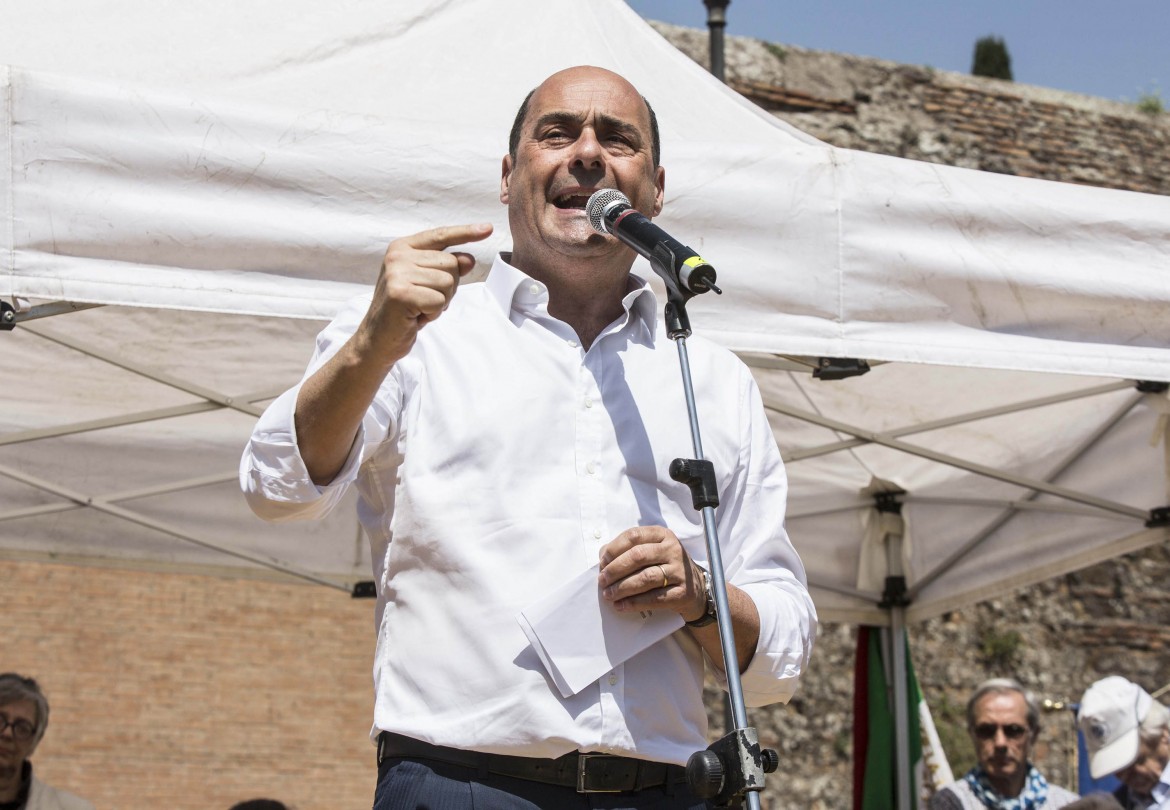Report
Italian Democrats: ‘In Italy, there is no longer a government’
In its no-confidence motion against the M5S-Lega government, the Italian Democratic Party ripped into the coalition from every possible angle: from corruption to paralysis to a failed economic plan.

The Democratic Party, led by Andrea Marcucci in the Senate, submitted a no-confidence motion on Tuesday against the yellow-green government. They argued that since the new government has taken over, “Italians are more indebted and isolated in the world,” and as “employment has declined, growth has stopped, insecurity and lawlessness have increased.”
The PD chose to file this largely symbolic motion instead of a motion of censure against Transport and Infrastructure Undersecretary Armando Siri (Lega), who is under investigation in a corruption probe. A motion of censure against Siri would have had a good chance to pass with the votes of the M5S, thus removing Siri from office in what would have been a great political gift for the Five Stars, as Di Maio and others have called for Siri’s removal, in yet another clash with the Lega.
In the end, the PD is doing his part to keep up the facade of principled conflict between the two allied parties, who need each other to keep the government afloat. Nonetheless, Marcucci did not miss the opportunity to attack the government coalition from every possible angle: “In Italy, there is no longer a government”—while, at the same time, “they have all glued themselves to their seats.”
Later on Tuesday, the Democratic Party ramped up its attacks against the government on multiple fronts. A demonstration was organized on Wednesday in Rome against the closure of three metro stations by the M5S-led city administration. A growing number of voices are speaking out “against the chaos regarding the ‘Salva Roma’ Decree,” led by the PD vice-president of the Lazio region, Massimiliano Smeriglio. [Editor’s note: The “Save Rome” Decree is a provision to pay off part of the debts of the city of Rome that was cut from a planned government decree on Wednesday after a conflict between the M5S and the Lega, at Salvini’s behest.]
PD Deputy Emanuele Fiano has publicly challenged the M5S to support legislation criminalizing the promotion of fascism after Salvini again decided he would not take part in the ceremony organized by the Jewish community of Rome on the occasion of the Italian Day of Liberation on April 25. In addition, on Wednesday afternoon, Zingaretti made a fiery speech in Castelvetrano (a town in the Trapani region in Sicily, the rumored hiding place of fugitive Mafia boss Messina Denaro) against the Mafia’s takeover of the town’s public administration, which was recently dissolved due to Mafia ties. [With Zingaretti’s speech, the center-left party is showing its support for Pasquale Calamia, who is running for mayor of Castelvetrano and has been threatened by the Mafia.]
As for the no-confidence motion against the government, Zingaretti knows it has almost no chance of passing. His actual goal is twofold: to put the Democratic Party back in the news, and—since the debate for the motion is scheduled before the May 26 European elections—to use the opportunity as part of their electoral campaign to denounce the opportunism of the M5S and the fall from grace of a party that used to run on the slogan “onestà onestà” (“honesty, honesty”).
The motion attacks the government for its “inconsistent results regarding economic growth.” It lists many figures that attest to the poor economic health of the country: the recently published Economic and Financial Planning document “has revealed an alarming picture of the public finances, which are once again out of control,” while the net debt, “compared to the forecast of 2% in December 2018, has increased to 2.4%,” a fiscal deterioration which, “as admitted by the government itself, renders certain the activation of spending cuts for the 2019 budget in the amount of €2 billion, including €300 million for local public transport.”
The PD motion also describes the current state of paralysis of the yellow-green government: “For months, government action has been paralyzed by internal opposition and internal reciprocal vetoes within the political majority, oriented exclusively towards gaining electoral benefits at the expense of the functioning of the central state administration and of the timely and effective management of the most pressing issues of the day.”
However, the crucial issue at the core of the argument for the lack of confidence in the government remains the corruption investigation involving Undersecretary Siri, whom the motion chooses not to mention by name: “The delicate international situation, the persistence of the economic and financial crisis … [and] the lack of confidence of businesses and the growing social malaise, which is affecting large sections of the population, would require a strong and secure government, politically cohesive, free from under-the-table deals and immune from even the mere suspicion of being subordinate to criminal interests.”
The allegations against Siri put the whole government in a very bad light, even though these are based on an ongoing investigation that is still far from the stage where it could be proven in a court of law. “In [Prime Minister Conte’s] speech held in the Senate on the occasion of the government’s swearing-in on June 5, 2018,” the text of the motion reads, “he placed the strengthening of the fight against corruption—which is creeping into every nook and cranny of public services—at the very center of the government’s plans.”
As the motion argues, Conte’s own words “render even more questionable […] the decision to bring someone onto the governing team who has already been definitively convicted for bankruptcy fraud and tax evasion, [offenses] whose nature and seriousness should have advised against this person’s appointment as Undersecretary, or, at the very least, should have barred this person from being assigned powers that would expose them to a possible conflict of interest.”
Originally published at https://ilmanifesto.it/il-pd-serve-un-governo-libero-dal-sospetto-di-asservimento-a-interessi-criminali/ on 2019-04-24
